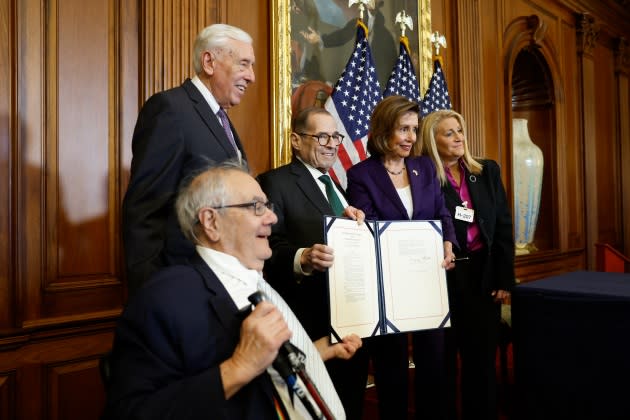Marriage Equality Bill Clears Congress In House Vote; Joe Biden Next Will Sign Protections For Same-Sex And Interracial Unions

The House gave final passage on Thursday to legislation to ensure federal recognition of same-sex and interracial unions, clearing a final milestone in Congress before going to President Joe Biden.
The legislation passed by a vote of 258-169. One member of House Republican leadership, Rep. Elise Stefanik (R-NY) joined with 38 other GOP members in voting for the bill. Rep. Tom Emmer (R-MN), who chaired the National Republican Congressional Commitee in the most recent midterms, also voted for it, along with Rep. Liz Cheney (R-WY).
More from Deadline
Democrats erupted in cheers as House Speaker Nancy Pelosi announced the final tally, with some LGBTQ members, including Sean Patrick Maloney of New York and Mark Takano of California hugging their colleagues. Barney Frank, the former congressman who was one of the most prominent openly gay members, was present on the floor for the vote, chatting and shaking hands with former colleagues.
The bill, the Respect for Marriage Act, was introduced in the wake of the Supreme Court’s decision repealing Roe Vs. Wade, amid concerns that the rationale for breaking with precedent on abortion would serve as the basis for chipping away at other high court decisions. In a concurring opinion in the abortion ruling, Justice Clarence Thompson raised the prospect of the court revisiting rulings on same-sex nuptials and contraception.
The bill’s prospects improved considerably last month when the 12 Republicans joined all Democrats in the Senate to advance the bill, allowing its backers to reach the 60-vote threshold to overcome a filibuster. That set the stage for eventual passage in the Senate.
The bill does not mandate that states allow same-sex and interracial couples to marry, but it does require that the federal government recognize same-sex and interracial marriages. To gain more bipartisan support, additional provisions were added that makes clear that religious organizations and non-profits would not be required to provide services or goods for marriage ceremonies. Another provision protects religious liberty and conscience protections available under the Constitution or federal law.
Republican opponents argued that the legislation would threaten the rights of religious institutions, even with protections in place. In arguing against the Respect for Marriage Act, Rep. Jim Jordan (R-OH) cited attacks on supporters of the Supreme Court’s abortion ruling.
But supporters contended that their arguments were contradictory and that it was an issue that the right should be embracing.
“I am shocked that conservatives with a libertarian bent believe that somehow we don’t get involved in this,” House Majority Leader Steny Hoyer (D-MD) said on the floor before the vote.
Hoyer, pointing to the continued threats facing the LGBTQ community, condemned the attack last month on an LGBTQ nightclub in Colorado Springs. “There is no place for violence, but let’s be clear. Let”s condemn all of it. Let’s do whatever we can to protect it, and let’s not stay on this concerted effort to intimidate the court.”
House Speaker Nancy Pelosi wrote in The Washington Post on Thursday that the bill would ensure that “the federal government will never again stand in the way of marrying the person you love.” As the roll call passed a majority, she at one point checked tally, as it became clear that the legislation would garner substantial Republican support.
She told reporters that the vote held special significance as it will be one of her final bills before she departs as speaker, and also because her first speech on the floor of the House was on the need to address HIV and AIDS. She also noted that the coincidence of the vote taking place on the same day of the release of Brittney Griner. She is “free to go to home to her wife on the same day that we pass the Respect for Marriage Act.”
That the bill got such backing from members of both parties reflected just how much public opinion has shifted on same-sex marriage, even within the past decade. The legislation was a repeal of the Defense of Marriage Act, legislation designed to stop recognition of same-sex marriage that passed with bipartisan support in 1996.
At a signing ceremony after the vote, Pelosi joined with Senate Majority Leader Chuck Schumer, as well as one of its key sponsors, including Sen. Tammy Baldwin (D-WI), the first lesbian elected to Congress, Rep. David Cicilline (D-RI) and Sen. Susan Collins (R-ME), who helped round up support among other Republicans.
“I was here for the birth of DOMA, so I am very grateful to be here for the funeral,” Frank said at the ceremony. Later, he quipped, “It’s a New Orleans funeral. Go on playing and parade.”
He told Deadline that he was not surprised by the passage of the bill, given that nationwide same-sex marriage protections have been in place for more than seven years. “The reality beats the prejudice,” he said. “Prejudice survives when there is no reality and people think of all these terrible things. And then reality comes into play, and there is no negative.” He also noted that “the only time that we ever get anything positive for LGBT rights is when you have a Democratic president and a Democratic House and Senate,” also noting that it occurred in the lame-duck session.
The Supreme Court’s 2015 decision in Obergefell Vs. Hodges recognized a right to same-sex marriage nationwide.
If the Supreme Court were to reverse Obergefell, it would mean that states could again restrict same-sex marriage rights. But the passage of the Respect for Marriage Act would mean that they would have to recognize marriages performed in other states. The bill also would enshrine rights and benefits at the federal level.
Best of Deadline
Sign up for Deadline's Newsletter. For the latest news, follow us on Facebook, Twitter, and Instagram.

 Yahoo Movies
Yahoo Movies 
